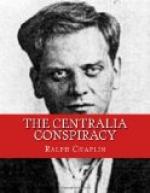The only sane note sounded during these dark days, outside of the startling statement of Dr. Bickford, came from Montana. Edward Bassett, commander of the Butte Post of the American Legion and an over-seas veteran, issued a statement to the labor press that was truly remarkable:
“The I.W.W. in Centralia, Wash., who fired upon the men that were attempting to raid the I.W.W. headquarters, were fully justified in their act.
“Mob rule in this country must be stopped, and when mobs attack the home of a millionaire, of a laborer, or of the I.W.W., it is not only the right but the duty of the occupants to resist with every means in their power. If the officers of the law can not stop these raids, perhaps the resistance of the raided may have that effect.
“Whether the I.W.W. is a meritorious organization or not, whether it is unpopular or otherwise, should have absolutely nothing to do with the case. The reports of the evidence at the coroner’s jury show that the attack was made before the firing started. If that is true, I commend the boys inside for the action that they took.
“The fact that there were some American Legion men among the paraders who everlastingly disgraced themselves by taking part in the raid, does not affect my judgment in the least. Any one who becomes a party to a mob bent upon unlawful violence, cannot expect the truly patriotic men of the American Legion to condone his act.”
Vanderveer’s Opening Speech
Defense Attorney George Vanderveer hurried across the continent from Chicago to take up the legal battle for the eleven men who had been arrested and charged with the murder of Warren O. Grimm. The lumber interests had already selected six of their most trustworthy tools as prosecutors. It is not the purpose of the present writer to give a detailed story of this “trial”—possibly one of the greatest travesties on justice ever staged. This incident was a very important part of the Centralia conspiracy but a hasty sketch, such as might be portrayed in these pages, would be an inadequate presentation at best. It might be well, therefore, to permit Mr. Vanderveer to tell of the case as he told it to the jury in his opening and closing arguments. Details of the trial itself can be found in other booklets by more capable authors. Vanderveer’s opening address appears in part below:
May it please the court and gentlemen of the jury:—As you have already sensed from our examination of you and from a question which I propounded to counsel at the close of his statement yesterday, the big question in this case is, who was the aggressor, who started the battle? Was it on the one side a deliberately planned murderous attack upon innocent marchers, or was it on the other side a deliberately planned wicked attack upon the I.W.W., which they merely resisted? That, I say, is the issue. I asked counsel what his position would be in order that you might know it, and that he said was his position, that he would stand and fall and be judged by it, and I say to you now that is our position, and we will stand or fall and be judged by that issue.




